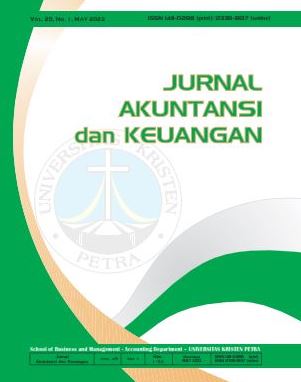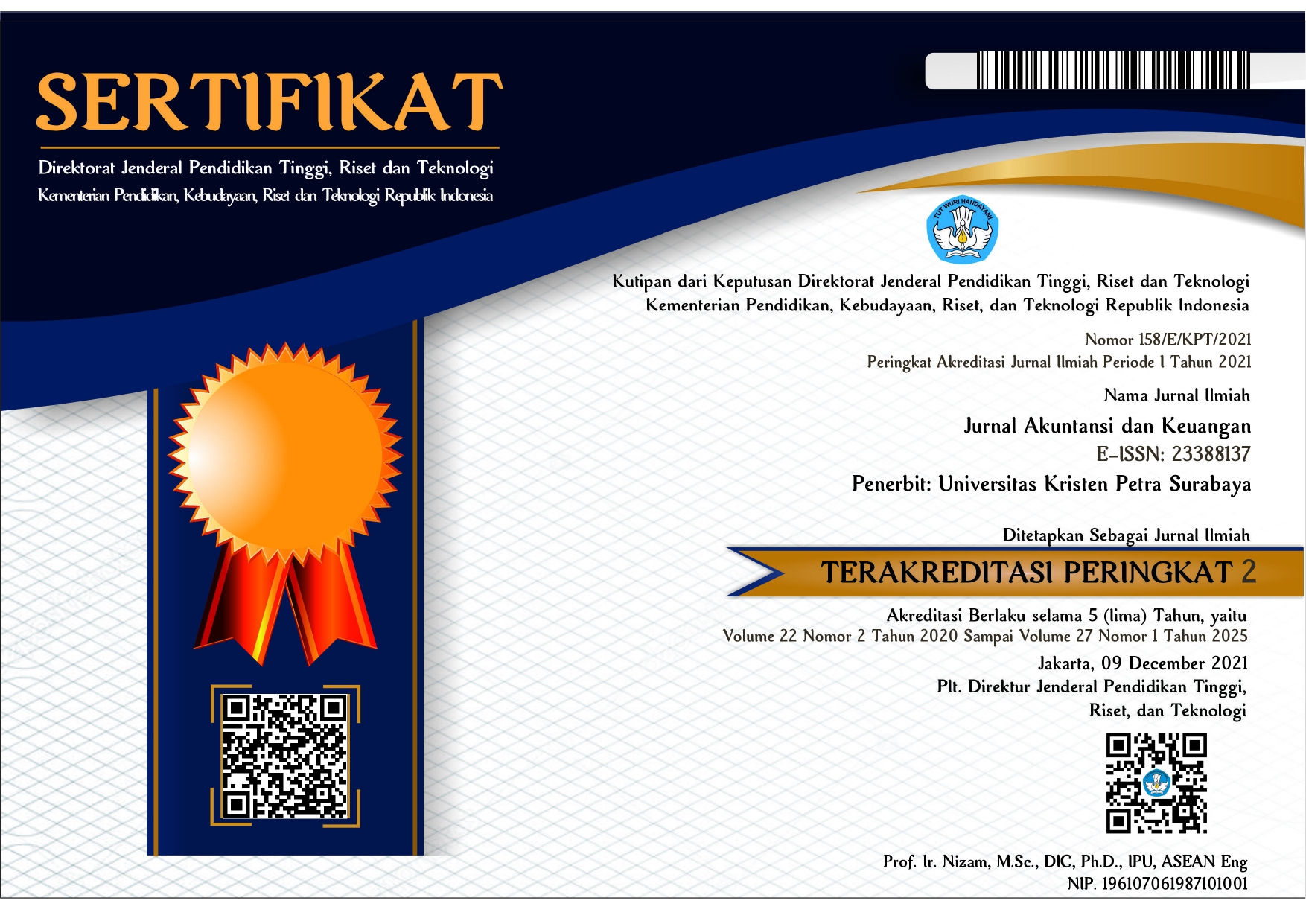Can the Reclassification of Other Comprehensive Income Narrow the Opportunities for Creative Accounting: Earnings Management and Income Smoothing?
DOI:
https://doi.org/10.9744/jak.25.1.25-38Keywords:
Other Comprehensive Income (OCI), Creative Accounting, Earnings Management, Income SmoothingAbstract
So far, research in Indonesia examines that the factors that influence creative accounting are the application of Good Corporate Governance, leverage, company size, and political connections, while research on the effect of other comprehensive income (OCI) as a result of the application of fair value accounting has not been widely carried out. This study finds evidence that aggregate OCI accumulation does not affect earnings management and income smoothing. However, testing on group OCI items that will be reclassified to net income has a negative effect. Asset realization commitment increases the negative effect of OCI on earnings management and income smoothing. Creative accounting through OCI can be done through a policy of delaying the realization time and or reducing the real amount of assets realized to get the net profit value according to the interests of management and the subjectivity of determining the fair value of assets and liabilities.
References
Agustia, D., & Palupi, A. (2018). Praktik Creative Accounting Pada Koperasi Di Jawa Timur. EKUITAS (Jurnal Ekonomi Dan Keuangan), 20(4), 528–543.
Akpanuko, E., & Umoren, N. (2018). The influence of creative accounting on the credibility of accounting reports. Journal of Financial Reporting and Accounting, 16(2), 292–310.
Alzoubi, E. S. S. (2016). Ownership structure and earnings management: evidence from Jordan. International Journal of Accounting & Information Management, 24(2), 1–20.
Banks, L., Hodgson, A., & Russell, M. (2018). The location of comprehensive income reporting – does it pass the financial analyst revision test? Accounting Research Journal, 31(4), 531–550.
Ben Amar, A., Ben Salah, O., & Jarboui, A. (2018). Do discretionary accruals affect firms’ corporate dividend policy? Evidence from France. Journal of Financial Reporting and Accounting, 16(2), 333–347.
Bhasin, M. (2016). Survey of Creative Account¬ing Practices : An Empirical Study. Wulfenia Journal, 13(1), 1-10.
Bima, P. G., Etna, Y., & Afri, N. (2017). Dampak Pengungkapan Pendapatan Komprehensif Lain Terhadap Manajemen Laba Pada Perusahaan Manufaktur di Indonesia. Diponegoro Journal of Accounting, 6(1), 1–15.
Chen, E., & Gavious, I. (2016). Unrealized earnings, dividends and reporting aggressiveness: An examination of firms’ behavior in the era of fair value accounting. Z, 56(1), 217–250.
Dechow, P. M., Sloan, R. G., & Sweeney, A. P. (1995). Detecting Earnings Management. The Accounting Review, 70(20), 193–225.
Eckel, N. (1981). Smoothing Hypothesis Revisited. Abacus, 17(1), 28–40.
Gupta, C. M., & Kumar, D. (2020). Creative accounting a tool for financial crime : A Review of The Techniques and Its Effects. 27(2), 397–411.
Halim, H., & Pangestu, S. (2020). Manajemen Laba pada Periode Initial Public Offering dan Dampaknya pada Persistensi Laba. E-Jurnal Akuntansi, 30(11), 2922.
Haykal, M. (2018). The discretionary accrual in the financial statement of a public company in Indonesia: A literature review. Emerald Reach Proceedings Series, 1, 595–600.
Hirota, H., & Yunoue, H. (2022). Fiscal rules and creative accounting: Evidence from Japanese municipalities. Journal of The Japanese and International Economies, 63(2021202).
Indracahya, E., Faisol, D. A., & Indracahya, E. (2017). The Effect of Good Corporate Governance Elements, Leverage, Firm Age, Company Size and Profitability on Earning Management. Jurnal Profita, 10(2), 203–227.
Irawati, N., Marlina, L., & Sipayung, F. (2019). Analysis of The Impact of Leverage, Value Added and Size on Earning Management and Financial Performance of Indonesian. Nternational Conference of Organizational Innovation (ICOI 2019), 100(Icoi), 404–409.
Jensen, M., & Meckling, W. (1976). Theory of The Firm: Managerial Behavior, Agency Costs and Ownership Structure. Journal of Financial Economics, 3, 305–360.
Juniarti, Helena, F., Novitasari, K., & Tjamdinata, W. (2018). The Value Relevance of IFRS Adoption in Indonesia. Jurnal Akuntansi Dan Keuangan, 20(1), 13–19.
Karampinis, N. I., & Hevas, D. L. (2013). Effects of IFRS Adoption on Tax-induced Incentives for Financial Earnings Management : Evidence from Greece. International Journal of Accounting, 48(2), 218–247. https://doi.org/ 10.1016/j.intacc.2013.04.003
Kim, H. J., & Yoon, S. S. (2019). Value-relevance of the regulatory non-GAAP adjustments in the Korean banking industry. Asia-Pacific Journal of Accounting and Economics, 26(1–2), 160–171.
Kusuma, M. (2016). Studi Tentang Beban Pokok Produksi, Pengaruhnya Terhadap Kemandirian Pendanaan Perusahaan Rokok Go Public di Indonesia. Jurnal Akuntansi Dan Ekonomi JAE, 1(1), 9–25.
Kusuma, M. (2017). Internalisasi Nilai Pancasila dalam Mata Kuliah Akuntansi Biaya. Jurnal Akuntansi Dan Ekonomi JAE, 2(2).
Kusuma, M. (2021a). Measurement of Return on Asset (ROA) based on Comprehensive Income and its Ability to Predict Investment Returns: An Empirical Evidence on Go Public Companies in Indonesia before and during the Covid-19 Pandemic. Ekuilibrium : Jurnal Ilmiah Bidang Ilmu Ekonomi, 16(1), 94.
Kusuma, M. (2021b). Modification of Profitability Measures with Comprehensive Income and Reclassification of Other Comprehensive Income as A Mediation of Effects Asset Utilization on Firm Value. Jurnal Keuangan Dan Perbankan, 25(4), 855–879.
Kusuma, M. (2020). Penghasilan komprehensif lain dan prediksi arus kas masa depan : Bukti dari Indonesia. Seminar Nasional SENIMA Ke 5 Universitas Negeri Surabaya, Prosiding Senima 5, 815–832.
Kusuma, M., Assih, P., & Zuhroh, D. (2021). Pengukuran Kinerja Keuangan : Return on Equity (ROE) Dengan Atribusi Ekuitas. Jurnal Ilmiah Manajemen Dan Bisnis, 22(2), 223–244.
Kusuma, M., & Athori, A. (2023). Can Income and Equity Attribution Minimize Agency Costs ? (Effect of Attribution Policy on Earn¬ings Management and Firm Value). Procee¬ding Medan International Economic and Business (MICEB) 2023, 1(1).
Kusuma, M., Chandrarin, G., & Cahyaningsih, D. S. (2022). Reclassification of Others Comprehensive Income, Earnings Management, and Earnings Quality : Evidence from Indonesia. Asia-Pacific Management Accounting Journal, 17(3), 205 – 237.
Kusuma, M., & Rahayu, P. (2022). Can Others Comprehensive Income Be Used for Tax Avoidance? Jurnal Akuntansi Dan Keuangan (JAK), 24(2), 68–79.
Kusuma, M., & Saputra, B. M. (2022). Pengaruh Fundamental Makro Ekonomi Terhadap Penghasilan Komprehensif Lain dan Persistensi Laba Komprehensif. Jurnal Kajian Akuntansi, 6(1), 145–176.
Kusuma, M., Zuhroh, D., Assih, P., & Chandrarin, G. (2021). The Effect of Net Income and Other Comprehensive Income on Future’s Comprehensive Income with Attribution of Comprehensive Income as Moderating Variable. International Journal of Financial Rese¬arch, 12(3), 205–219.
Lukman, H., & Irisha, T. (2020). The Effect of Creative Accounting Practices with Statutory Auditor as Mediation, and Accountant Ethics Standards on the Reliability of Financial State-ments. Proceedings of the 2nd Tarumanagara International Conference on the Applications of Social Sciences and Humanities (TICASH 2020), 478(Ticash), 1023–1029.
Mappadang, A. (2021). Corporate Governance and Corporate Tax Avoidance: An Interactive Effects (Evidence from Indonesia Capital Market). Jurnal Keuangan Dan Perbankan, 25(1), 81–92.
Murdiyanto, E., & Kusuma, M. (2022). Moderasi Leverage dalam Pengaruh Ukuran Bank dan Aset Keuangan Terhadap Kinerja Keuangan Komprehensif BPR Konvensional dan BPR Syariah Se-Kediri Raya. Jurnal Ekonika : Jurnal Ekonomi Universitas Kadiri, 7(2).
Ndebugri, H. (2017). Analyzing the Critical Effect of Creative Accounting Practice in The Corporate Sector of Ghana.
Patmawati, Rahmawati, M., & Ghozali, E. O. D. (2021). Creative Accounting Behaviour : Mencerminkan Kinerja Baik Atau Menyesatkan ? Journal Management, Business, and Accounting, 20(2), 162–176.
Pradipta, K. D., & Handayani, S. (2020). The Effect of Leverage Towards Dividend Policy Mediated by Creative Accounting. Jurnal Akrual, 11(2), 122–135.
Putra, Z. K. P., & Suhardianto, N. (2020). The Influence of Political Connection on Tax Avoidance. Jurnal Akuntansi Dan Keuangan, 22(2), 82–90.
Remenaric, B., Mijoc, I., & Kenfelja, I. (2018). Creative Accounting – Motives, Techniques and Possibilities of Prevention. Ekonomski Vjesnik Econviews, 31(1), 193–199.
Robik, K., Naruli, A., & Kusuma, M. (2021). Moderasi Kualitas Audit Dalam Pengaruh Manajemen Laba Terhadap Kualitas Laba Komprehensif. Jurnal Cendekia Akuntansi, 2(2), 27–46.
Shatiti, L., & Achmad, T. (2020). Pengaruh Mekanisme Corporate Governance Terhadap Praktik Creative Accounting (Studi Empiris Pada Perusahaan Manufaktur Yang Terdaftar Di Bursa Efek Indonesia Tahun 2014-2018 ). Diponegoro Journal of Accounting, 9(2010), 1–10.
Sparta, S., & Trinova, N. (2020). The Effect of Income Smoothing and Procyclicality Behavior on the Bank Credit Impairment Losses with IAS 39 Adoption in PSAK 55 as a Moderating Variable. Journal of Economics, Business, and Accountancy Ventura, 22(3), 360–371.
Watts, R. L., & Zimmerman, J. L. (1978). Towards A Positive Theory of The Determination of Accounting Standards. Accounting Review, 112–133.
Yuanita, D. W., Dewi, C. N., Susilo, A. Z., & Kusharyanti, K. (2020). Foreign investor’s interest and tax avoidance: contingency perspectives depending on coun-try’s protection level and law systems. Gadjah Mada International Journal of Business, 22(1), 74–98.
Zhao, X., Zhao, K., & Wei, W. (2018). Earnings Management using Other Comprehensive Income Items: A Multi-Case Study on Chinese Listed Companies. Ssah, 198–201.
Downloads
Published
How to Cite
Issue
Section
License
Authors who publish with this journal agree to the following terms:
- Authors retain the copyright and publishing right, and grant the journal right of first publication with the work simultaneously licensed under a Creative Commons Attribution License that allows others to share the work with an acknowledgement of the work's authorship and initial publication in this journal.
- Authors are able to enter into separate, additional contractual arrangements for the non-exclusive distribution of the journal's published version of the work (e.g., post it to an institutional repository or publish it in a book), with an acknowledgement of its initial publication in this journal.
- Authors are permitted and encouraged to post their work online (e.g., in institutional repositories or on their website) followingthe publication of the article, as it can lead to productive exchanges, as well as earlier and greater citation of published work (See The Effect of Open Access).<a href="http://creativecommons.org/lice















